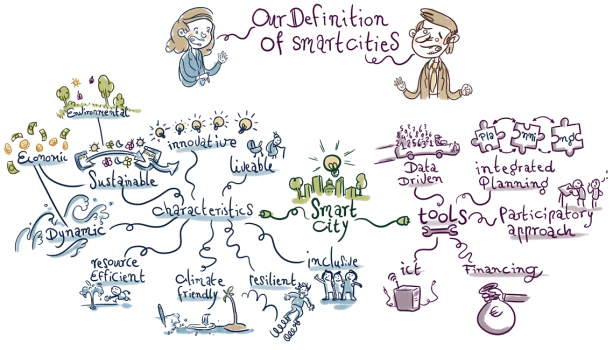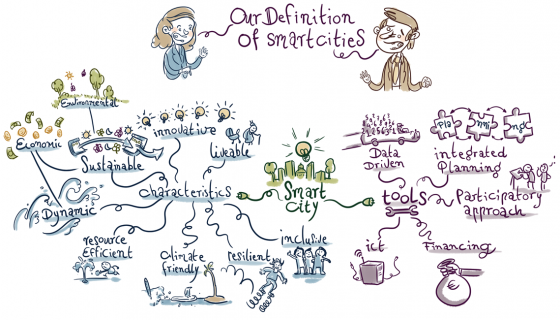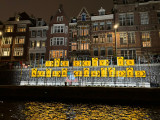From our experiences at the Smart City Expo World Congress last November, one thing became clearer than ever before: cooperation is key. We should not strive to reinvent the wheel; instead we should learn from each other, cooperate. In a series of four blog posts our intern Luc Baardman investigates the challenges of other smart cities in Europe.
Is it “smart” to cooperate? Aren’t cities in a constant competition with each other to attract the brightest minds and biggest corporates? From this urban
entrepreneurialism’s point of view, one might only see objections to cooperation.
Are we really giving away our secrets? I think we don’t. Cooperation is only viable once it is mutually beneficial. It is a sign of strength to cooperate and to learn from other people’s mistakes before you make the same ones.
Because it is always wise to regularly check how other cities are doing, Amsterdam Smart City contacted other Smart City programs and asked what difficulties these programs faced. Moreover, we asked how other cities have overcome these challenges.
Smart City projects are as diverse as our cities, and it therefore is not easy to compare cities with one another. What works in Amsterdam would not necessarily work in London, Berlin or Copenhagen.
The will to overcome urban issues is however universal, and so is the majority of practical actions: every city, big or small, develops programs and projects to support solving issues. Actions in this sense usually take the shape of roundtables, workshops, lectures or discussions. However: no project is implemented a 100% according to the plan. People always find difficulties or problems arising, and by adapting to the situation, cities create valuable knowledge. Knowledge that a city can use to better prepare for future events and knowledge that can be shared with other cities.
It is this type of knowledge that we are looking for: learning from other smart cities.
Questions we asked to know this are:
- What were some unexpected issues that came up during the implementation of a smart city project?
- How did your city of overcome the issue of rising inequalities?
Amsterdam
We’ve noticed that other cities also want to learn from Amsterdam. For example, we often receive the question how we involve the citizens. In short, our Amsterdam approach envisions a central role for citizens in each and every project undertaken. Yet, within this approach, we ourselves are sometimes still puzzled. Well, how do we work on this?
Let’s take the example of citizen engagement. For instance, we design a project to have citizens involved in the decision-making process. How do we also activate those that do not automatically make themselves heard? By, for example, being present at surprising locations all over the city we increase the chance that people – other than the usual suspects - will attend our events. In an earlier article by a colleague of mine, Colette van der Minne, Amsterdam Smart City explored the Manchester approach [link longread Colette] to citizen engagement, and noticed that Amsterdam can learn from the inclusive approach taken in Manchester. We hope to learn even more through the WeMakeTheCity event to be held in June next year! (linkje naar wemakethecity event).
Amsterdam can still learn a lot from other cities, that is why we embarked on a journey in which we approached other European cities. First we look at two collaborations held in the past and present: TRANSFORM (past) and the GSC3 (present). Our second, third and fourth article will provide the top tips, tricks and lessons learned from Smart City initiatives in Berlin, Helsinki and Copenhagen.
TRANSFORM
TRANSFORM was a European collaboration of six European Cities including Amsterdam, Copenhagen, Genoa, Hamburg, Vienna and Lyon and thirteen partners working together to improve their policy and programs to lower carbon dioxide emissions.
The overall goal of TRANSFORM was to design and build tools to support the energy transition of cities. TRANSFORM defined a smart city as a city which uses its characteristics and tools to make a vision into reality. Where these characteristics (see the image) range from sustainable to innovative, to resilient, liveable and dynamic, TRANSFORM set out to develop tools that urban governments can use.

Source: TRANSFORM; 2015
Together with the tools and methods we developed, TRANSFORM discovered that it is far from easy to change an existing city when it comes to energy use and production. “We learned that energy transformation is a complex process with many stakeholders, huge financial investments, legal, political, societal, organizational constraints. Transformation influences the life of citizens, politicians and businesses.” (TRANSFORM, 2015; <http://urbantransform.eu/about/> ).
GSC3
The cooperative nature of Amsterdam is also visible through a membership at the Global Smart City & Community Coalition (GSC3). GSC3 is a closed community that accelerates the opening up of a strong global city market for urban solutions, and with that, create sustainable industry jobs and improve well-being. On this platform, cities can share their knowledge, experiences, agendas and business models here to help each other.
GSC3 helps the Amsterdam Smart City program by connecting us with other smart city programs and checking which solutions could be viable for copying. It also collects the wish lists of CTOs and examines possible gaps in the supply side. To learn more about GSC3 and city cooperation, check this video: <https://www.youtube.com/watch?v=0zWd0bxRt8c> or their webpage gsc3.info.
Since I have your attention, please join the discussion below, answering one of the following questions. What top-tip would you give to Amsterdam in developing a Smart City? How do you want your government to learn from the Amsterdam Approach? Comment below: we’re eager to find out!
A closing quote to inspire your comments:
“Fools learn from experience. I prefer to learn from the experience of others”
Otto von Bismarck





Great to join, we are likewise setting up an interactive talks of Smart City. If you would like to join us as well: https://amsterdamsmartcity.com/posts/smart-cities-and-intelligent-destinations-connect.